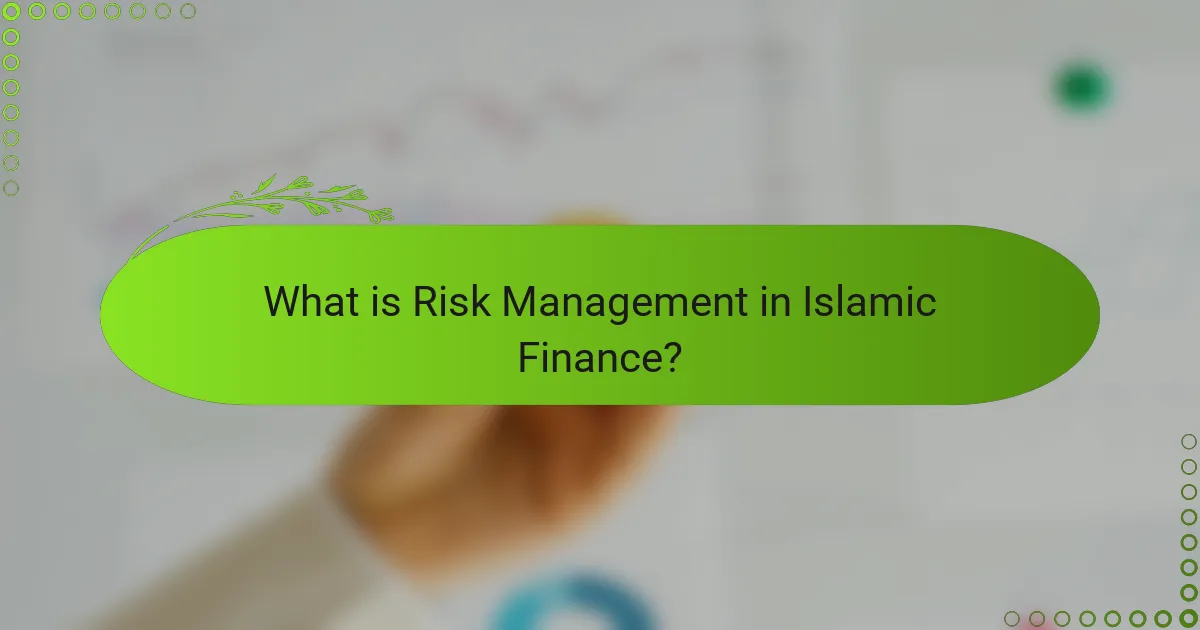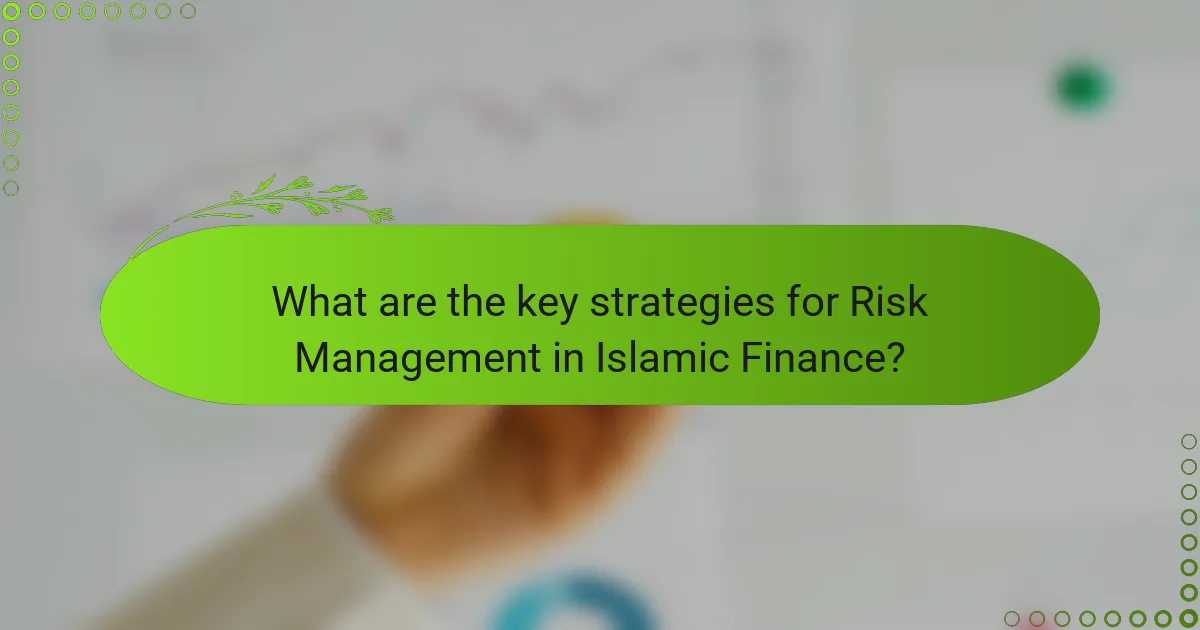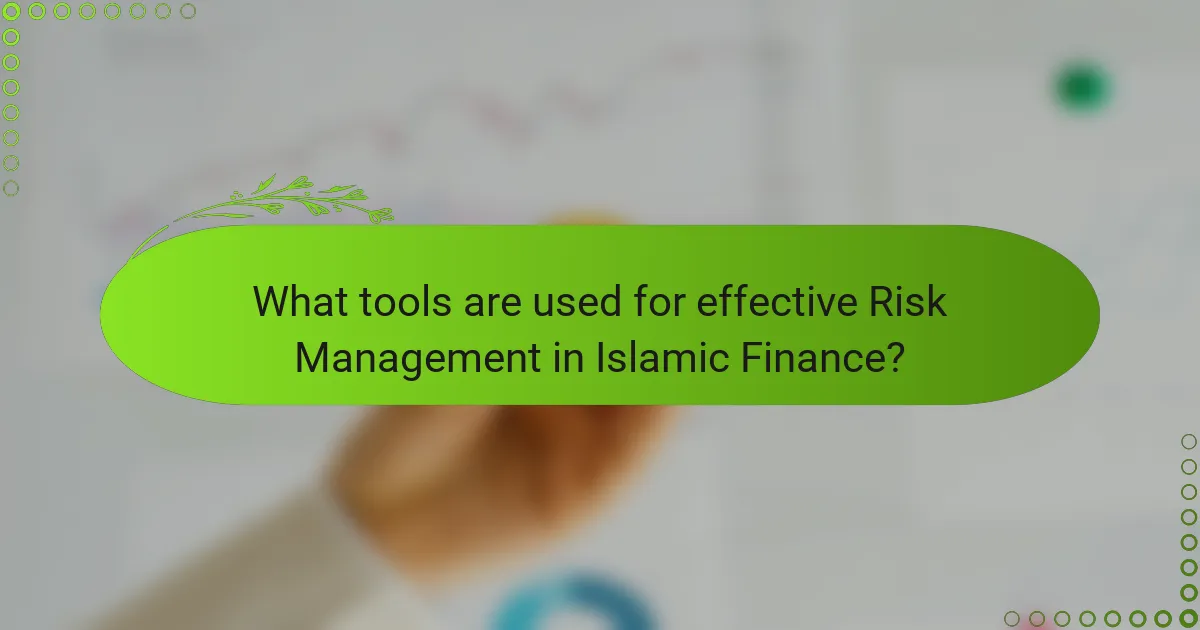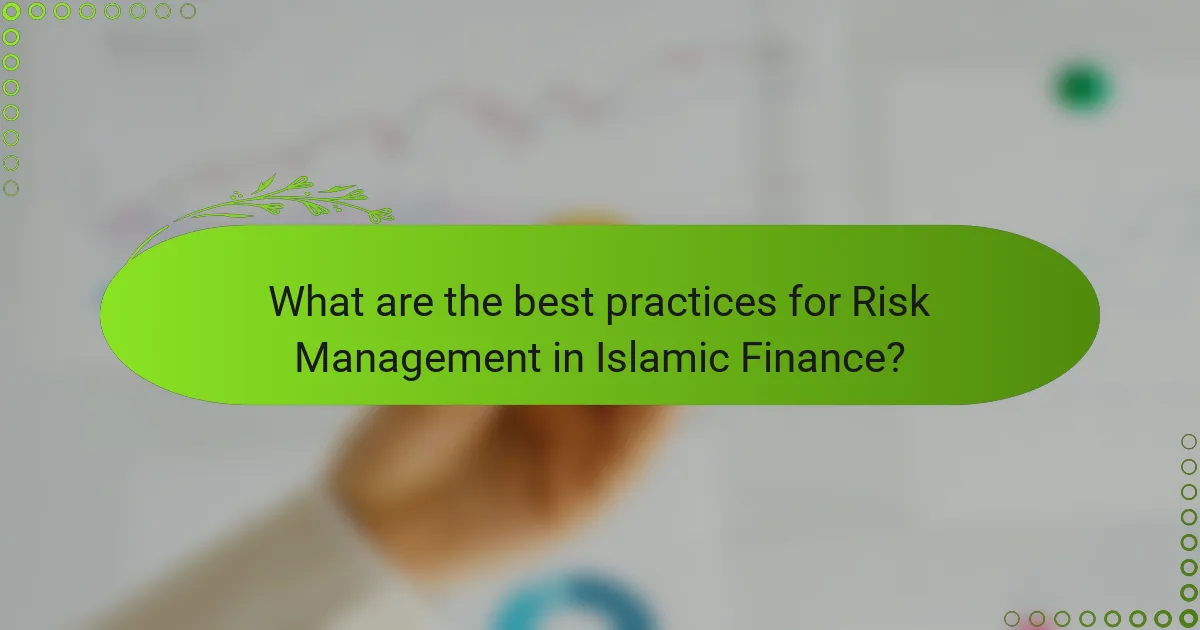
What is Risk Management in Islamic Finance?
Risk management in Islamic finance refers to the systematic process of identifying, assessing, and mitigating risks associated with financial transactions that comply with Islamic law (Sharia). It involves techniques that ensure adherence to principles such as the prohibition of interest (riba) and excessive uncertainty (gharar). Islamic finance utilizes various tools, including profit-sharing contracts (Mudarabah) and joint ventures (Musharakah), to distribute risk fairly among parties. The objective is to create a stable financial environment that promotes ethical investing and social justice. Effective risk management is crucial for safeguarding investments and maintaining trust among stakeholders in Islamic financial institutions.
How does Risk Management differ in Islamic Finance compared to conventional finance?
Risk management in Islamic finance differs significantly from conventional finance primarily due to the prohibition of interest (riba) and the emphasis on ethical investments. Islamic finance adheres to Shariah principles, which require risk-sharing and asset-backed financing. This contrasts with conventional finance, where risk transfer and speculative investments are common.
In Islamic finance, risk is managed through contracts like Mudarabah and Musharakah, promoting partnership and shared profits. Conventional finance typically relies on derivatives and insurance, which may involve uncertainty and speculation. The Islamic approach also prohibits excessive uncertainty (gharar), ensuring transparency in transactions.
Furthermore, Islamic finance emphasizes social responsibility and ethical considerations in investments. This focus on moral dimensions shapes risk management strategies differently than in conventional finance, which may prioritize profit maximization without ethical constraints. Overall, the fundamental principles of Shariah create a distinct framework for risk management in Islamic finance compared to conventional practices.
What are the foundational principles of Islamic finance that influence risk management?
The foundational principles of Islamic finance that influence risk management include the prohibition of riba (interest), gharar (excessive uncertainty), and the requirement for ethical investments. Riba prohibits earning interest, promoting profit-sharing instead. This principle encourages risk-sharing between parties. Gharar restricts contracts with excessive uncertainty, ensuring clarity and fairness. Ethical investments must align with Shariah law, avoiding industries like alcohol or gambling. These principles guide financial transactions to promote fairness and social justice. They create a stable financial environment by minimizing risks associated with unethical practices. Thus, Islamic finance principles foster responsible risk management.
How do Shariah-compliant contracts affect risk management strategies?
Shariah-compliant contracts significantly influence risk management strategies by ensuring adherence to Islamic law. These contracts prohibit excessive uncertainty (gharar) and interest (riba), which mitigates financial risks. By emphasizing transparency and fairness, they promote ethical business practices. This leads to more stable financial environments. For example, profit-sharing agreements like Mudarabah distribute risk between parties. Additionally, risk-sharing mechanisms such as Takaful provide alternative insurance solutions. The integration of these principles fosters trust and reduces conflicts. Overall, Shariah-compliant contracts enhance risk management by aligning financial practices with ethical standards.
Why is Risk Management crucial in Islamic Finance?
Risk management is crucial in Islamic finance to ensure compliance with Shariah law. It prevents excessive uncertainty and speculation, which are prohibited in Islamic finance. Effective risk management protects the financial integrity of institutions. It also fosters trust among stakeholders by ensuring ethical practices. Moreover, it enhances financial stability and promotes sustainable economic growth. According to the Islamic Financial Services Board, effective risk management frameworks are essential for the resilience of Islamic financial institutions. This adherence to principles ultimately safeguards the interests of all parties involved.
What are the potential risks faced by Islamic financial institutions?
Islamic financial institutions face several potential risks, including Shariah compliance risk, credit risk, market risk, and operational risk. Shariah compliance risk arises when financial products or practices do not align with Islamic law. Credit risk occurs when borrowers fail to meet their financial obligations. Market risk involves losses due to fluctuations in market prices and interest rates. Operational risk is linked to failures in internal processes, systems, or people. These risks can significantly impact the stability and reputation of Islamic financial institutions, necessitating robust risk management strategies.
How can effective risk management enhance trust in Islamic finance?
Effective risk management enhances trust in Islamic finance by ensuring compliance with Sharia principles. It mitigates financial uncertainties and reduces the potential for disputes. Transparent risk assessment processes build confidence among stakeholders. Regular audits and risk evaluations demonstrate accountability and integrity. By adhering to ethical standards, Islamic finance institutions foster a positive reputation. Research shows that organizations with robust risk management practices experience higher customer satisfaction. This leads to increased customer loyalty and investment. Overall, effective risk management is essential for maintaining trust in the Islamic finance sector.

What are the key strategies for Risk Management in Islamic Finance?
Key strategies for risk management in Islamic finance include diversification, risk-sharing, and compliance with Sharia principles. Diversification reduces exposure to specific risks by spreading investments across various assets. Risk-sharing involves structuring financial products that distribute risk among participants. Compliance with Sharia ensures that all financial practices adhere to Islamic law, minimizing legal and reputational risks. Additionally, effective governance frameworks are essential for monitoring and managing risks. Institutions often implement robust risk assessment tools to identify potential issues early. Regular audits and stress testing are also critical in maintaining financial stability. These strategies collectively enhance the resilience of Islamic financial institutions.
How can Islamic financial institutions identify and assess risks?
Islamic financial institutions can identify and assess risks through a comprehensive risk management framework. This framework includes risk identification, risk measurement, and risk mitigation strategies. They typically analyze various risk categories such as credit risk, market risk, operational risk, and liquidity risk.
Islamic finance principles require compliance with Sharia law, which influences risk assessment. Institutions often utilize tools like stress testing and scenario analysis to evaluate potential impacts. They also engage in continuous monitoring to adapt to changing market conditions.
Moreover, risk assessment is supported by adherence to guidelines from organizations like the Islamic Financial Services Board (IFSB). The IFSB provides standards that help in identifying specific risks unique to Islamic finance. This structured approach ensures that risks are systematically identified and assessed, maintaining financial stability and compliance with Islamic principles.
What tools are available for risk assessment in Islamic finance?
Tools available for risk assessment in Islamic finance include risk management frameworks, stress testing, and risk modeling techniques. Risk management frameworks provide structured approaches to identify, evaluate, and mitigate risks. Stress testing assesses the resilience of financial institutions under adverse conditions. Risk modeling techniques utilize statistical methods to quantify potential losses. Additionally, tools such as credit scoring models and market analysis tools are employed to evaluate credit risk and market risk. These tools are essential for ensuring compliance with Shariah principles while managing financial risks effectively.
How do Islamic finance principles guide risk identification?
Islamic finance principles guide risk identification by emphasizing transparency, ethical conduct, and the prohibition of uncertainty (gharar). These principles ensure that all parties involved understand the risks associated with financial transactions. The prohibition of interest (riba) encourages risk-sharing rather than risk transfer. This creates a more equitable distribution of risk among stakeholders. Additionally, Islamic finance promotes asset-backed financing, which links financial transactions to tangible assets. This connection helps identify risks related to the underlying assets. Furthermore, the focus on ethical investments ensures that risks are assessed in light of social and environmental impacts. Overall, these principles create a framework that enhances risk awareness and management in financial activities.
What risk mitigation strategies are commonly employed?
Commonly employed risk mitigation strategies include diversification, insurance, and hedging. Diversification reduces risk by spreading investments across various assets. Insurance protects against specific losses, providing financial support in adverse situations. Hedging involves using financial instruments to offset potential losses in investments. These strategies are essential in managing risks effectively in Islamic finance. For instance, diversification can lead to a more stable portfolio. Research shows that diversified portfolios often exhibit lower volatility compared to concentrated ones. Insurance is crucial in Islamic finance, adhering to Sharia principles while safeguarding investments. Hedging techniques, such as using options and futures, help mitigate risks associated with price fluctuations.
How does diversification play a role in risk management?
Diversification reduces risk by spreading investments across various assets. This strategy minimizes exposure to any single asset’s poor performance. When one asset underperforms, others may perform well, balancing overall returns. Historical data shows that diversified portfolios often have lower volatility. For instance, a study by Markowitz in 1952 established the benefits of diversification in portfolio theory. It demonstrated that combining assets with low correlation can lead to a more stable investment outcome. Thus, diversification is a fundamental principle in effective risk management.
What are the best practices in structuring Islamic financial products to manage risk?
Best practices in structuring Islamic financial products to manage risk include adherence to Shariah compliance, diversification of assets, and the use of profit-sharing contracts. Shariah compliance ensures that products do not involve prohibited elements such as interest (riba) or excessive uncertainty (gharar). Diversification of assets reduces exposure to specific risks by spreading investments across various sectors or asset classes. Profit-sharing contracts, such as Mudarabah and Musharakah, align the interests of parties involved and share risks and rewards equitably. Additionally, regular monitoring and assessment of risk factors are essential to adapt to changing market conditions. These practices collectively enhance the stability and sustainability of Islamic financial products.

What tools are used for effective Risk Management in Islamic Finance?
Effective risk management in Islamic finance utilizes tools such as Shariah-compliant contracts, risk-sharing instruments, and hedging mechanisms. Shariah-compliant contracts include Mudarabah and Musharakah, which facilitate profit-sharing and partnership models. Risk-sharing instruments distribute risks among stakeholders, promoting equity and fairness. Hedging mechanisms like Islamic swaps and options help manage market risks while adhering to Islamic principles. These tools ensure compliance with Shariah law and mitigate financial risks effectively.
What technological tools are available for managing risks?
Technological tools for managing risks include risk assessment software, data analytics platforms, and risk management information systems (RMIS). Risk assessment software helps identify potential risks by analyzing historical data and trends. Data analytics platforms provide insights through real-time data processing and predictive modeling. RMIS offers a centralized platform for tracking and reporting risks across an organization. These tools enhance decision-making and improve risk mitigation strategies. According to a report by Deloitte, organizations using advanced analytics for risk management see a 20% improvement in risk identification accuracy.
How can data analytics improve risk management in Islamic finance?
Data analytics can significantly enhance risk management in Islamic finance by providing insights into financial behaviors and trends. It enables institutions to analyze large datasets to identify potential risks associated with Sharia-compliant investments. Predictive analytics can forecast market fluctuations, allowing for proactive risk mitigation strategies.
Furthermore, data analytics helps in monitoring compliance with Sharia principles, ensuring that all financial activities adhere to Islamic law. By utilizing machine learning algorithms, organizations can detect anomalies in transactions that may indicate fraudulent activities.
Research indicates that financial institutions employing data analytics experience improved decision-making processes. A study by Deloitte highlights that 70% of executives believe data analytics is crucial for managing risks effectively. This shows that integrating data analytics into risk management frameworks in Islamic finance leads to better outcomes and compliance.
What role does artificial intelligence play in risk assessment?
Artificial intelligence plays a crucial role in risk assessment by enhancing data analysis and decision-making processes. AI algorithms can identify patterns in large datasets that humans may overlook. This capability allows for more accurate predictions of potential risks. Machine learning models can continuously improve their accuracy as they process more data. AI tools can automate routine risk assessment tasks, increasing efficiency. In financial sectors, AI helps in detecting fraudulent activities and assessing credit risks. A study by Deloitte highlights that organizations using AI in risk management see a 30% reduction in risk-related losses. Overall, AI significantly improves the effectiveness of risk assessment strategies.
What traditional tools are still relevant in Islamic finance risk management?
Traditional tools still relevant in Islamic finance risk management include profit-sharing contracts, mudarabah and musharakah. Mudarabah allows capital providers to share profits with entrepreneurs. Musharakah involves joint ventures where all partners contribute capital and share profits and losses.
These tools align with Shariah principles by promoting risk-sharing rather than risk transfer. They encourage ethical investment and financial inclusion. Historical practices show their effectiveness in fostering trust and collaboration among participants.
Additionally, the use of Islamic insurance, or takaful, is critical. Takaful operates on mutual cooperation principles, where participants contribute to a pool to cover risks. This method has been widely adopted and remains essential in managing risks in Islamic finance.
How do risk-sharing contracts function in mitigating financial risk?
Risk-sharing contracts function by distributing financial risk among multiple parties. This arrangement allows participants to share both potential losses and gains. It reduces the burden on any single entity, promoting stability. For example, in Islamic finance, contracts like Mudarabah and Musharakah exemplify risk-sharing principles. In Mudarabah, one party provides capital while the other manages the investment. Profits are shared according to a pre-agreed ratio, while losses are borne by the capital provider. Musharakah involves all parties contributing capital and sharing profits and losses in proportion to their investment. This collaborative approach mitigates individual financial exposure and fosters trust among participants. Studies have shown that risk-sharing mechanisms can enhance financial resilience in volatile markets.
What is the importance of insurance (Takaful) in risk management?
Insurance, specifically Takaful, plays a crucial role in risk management by providing a cooperative model for risk sharing. Takaful operates on principles of mutual assistance and solidarity among participants. This system allows individuals to pool their resources to cover potential losses. By doing so, Takaful helps mitigate financial burdens during unforeseen events. Participants contribute to a fund, which is used to support those in need, enhancing community resilience. In contrast to conventional insurance, Takaful adheres to Islamic principles, ensuring ethical investment and risk-sharing. This alignment with Shariah law promotes financial stability and social welfare within communities.

What are the best practices for Risk Management in Islamic Finance?
The best practices for risk management in Islamic finance include adherence to Shariah compliance, diversification of investments, and robust governance frameworks. Shariah compliance ensures that financial activities align with Islamic law. This compliance mitigates risks associated with non-compliant investments. Diversification reduces exposure to specific risks by spreading investments across various sectors. A robust governance framework enhances transparency and accountability in decision-making processes. Regular risk assessments and stress testing are essential to identify potential vulnerabilities. Additionally, effective communication with stakeholders fosters trust and collaboration. These practices collectively strengthen the resilience of Islamic financial institutions.
How can Islamic financial institutions align their practices with Shariah compliance?
Islamic financial institutions can align their practices with Shariah compliance by adhering to Islamic law principles. This includes avoiding interest (riba), excessive uncertainty (gharar), and investing in haram (prohibited) activities. They must ensure that all financial products and services comply with Shariah guidelines. Regular audits by Shariah boards are essential for oversight. Training staff on Shariah principles enhances compliance awareness. Developing clear policies that reflect Islamic values supports consistent practices. Engaging with scholars for guidance promotes adherence to evolving interpretations of Shariah. These measures collectively ensure that Islamic financial institutions operate within the framework of Shariah law.
What governance structures are essential for effective risk management?
Effective risk management requires a robust governance structure. Key components include a risk management committee, which oversees risk policies and frameworks. This committee should consist of senior management and board members. Clear roles and responsibilities must be defined for risk management personnel. Regular risk assessments should be conducted to identify and evaluate potential risks. Compliance with regulatory requirements is essential for maintaining governance integrity. Additionally, effective communication channels must be established for reporting risks. Evidence shows that organizations with strong governance structures experience fewer risk-related incidents. Research indicates that a well-defined governance framework enhances decision-making and accountability in risk management.
How can continuous training and education improve risk management practices?
Continuous training and education enhance risk management practices by equipping professionals with updated knowledge and skills. This ongoing learning process helps individuals identify and assess risks more effectively. It also fosters a culture of proactive risk management within organizations. Research shows that companies investing in employee training experience a 24% increase in risk mitigation effectiveness. Furthermore, continuous education enables teams to stay informed about regulatory changes and industry best practices. This alignment with current standards minimizes compliance risks. Additionally, training enhances decision-making capabilities, leading to quicker responses to emerging threats. Overall, continuous training and education are vital for improving risk management outcomes.
What common challenges do Islamic financial institutions face in risk management?
Islamic financial institutions face several common challenges in risk management. One major challenge is the lack of standardized risk management frameworks. This inconsistency can lead to varying interpretations of Sharia compliance. Additionally, limited access to risk management tools tailored for Islamic finance exacerbates the issue. The complexity of Islamic financial products also increases the difficulty in assessing risks accurately. Another challenge is the need for skilled professionals who understand both finance and Sharia law. Furthermore, the exposure to market volatility poses significant risks, particularly in less regulated markets. Finally, regulatory uncertainty can hinder effective risk management practices within these institutions.
How can institutions overcome regulatory challenges in risk management?
Institutions can overcome regulatory challenges in risk management by adopting a proactive compliance strategy. This includes staying updated on regulatory changes and engaging with regulators. Institutions should develop robust risk assessment frameworks tailored to their specific needs. Implementing comprehensive training programs for staff on compliance and risk management is essential. Utilizing technology can streamline reporting and monitoring processes. Collaboration with industry groups can also provide insights into best practices. Regular audits and reviews help ensure adherence to regulations. By fostering a culture of compliance, institutions can effectively navigate regulatory landscapes.
What strategies can enhance the resilience of Islamic finance against market volatility?
Diversification of investment portfolios enhances the resilience of Islamic finance against market volatility. This strategy minimizes risk by spreading investments across various sectors and asset classes. For example, Islamic finance can invest in real estate, equities, and commodities. Such diversification reduces exposure to any single market downturn.
Implementing robust risk management frameworks is another effective strategy. These frameworks assess and mitigate risks associated with Sharia-compliant investments. Regular stress testing can identify vulnerabilities in financial products.
Utilizing hedging instruments that comply with Islamic law is also crucial. Instruments like Islamic swaps can protect against interest rate fluctuations. This compliance ensures that risk management practices align with Sharia principles.
Building strong regulatory frameworks further supports resilience. Regulations that promote transparency and ethical practices enhance investor confidence. This confidence can stabilize markets during turbulent times.
Lastly, fostering financial literacy among stakeholders is essential. Educated investors make informed decisions, reducing panic during market fluctuations. This collective understanding contributes to a more stable financial environment.
What practical tips can improve Risk Management in Islamic Finance?
Implementing a robust risk management framework is crucial in Islamic finance. First, ensure compliance with Shariah principles to avoid non-compliance risks. Regular audits can identify areas of concern. Second, diversify investments to spread risk across various asset classes. This reduces exposure to any single investment. Third, employ risk-sharing contracts like Mudarabah and Musharakah. These contracts align interests and distribute risks among parties. Fourth, utilize advanced risk assessment tools and models tailored for Islamic finance. These tools can provide insights into potential risks. Lastly, continuous training for staff on risk management practices is essential. Educated personnel can better identify and mitigate risks in Islamic finance operations.
Risk management in Islamic finance is a systematic process focused on identifying, assessing, and mitigating risks associated with financial transactions that comply with Sharia law. The article explores the distinct approaches of Islamic finance compared to conventional finance, emphasizing principles such as the prohibition of interest (riba) and excessive uncertainty (gharar). It outlines key strategies for effective risk management, including diversification, risk-sharing contracts, and Shariah compliance, as well as tools like profit-sharing agreements and Takaful. Additionally, the article addresses the challenges faced by Islamic financial institutions and offers best practices for enhancing resilience and trust within the sector.